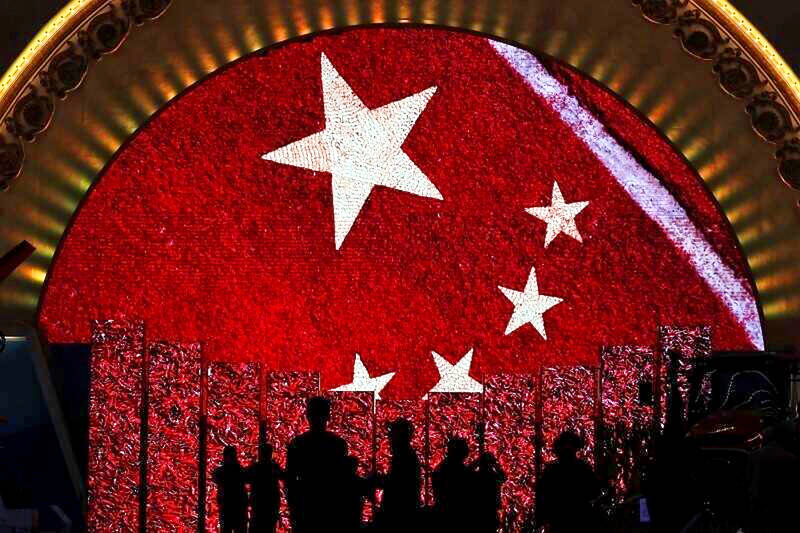Beijing aims to establish a political party in Taiwan using Taiwanese entertainers and social media influencers to attract members, people who have allegedly received a prospectus letter from China said yesterday.
Singer Alexis Ho (何以奇) and musician Hsieh Ho-hsien (謝和弦), also known as “R-chord” were among those who told reporters they received letters sent from a media company based in Beijing.
They said the letters outlined a plan to form a party with funding of about NT$450 million (US$13.91 million).

Photo: AP
The “Taiwan Support Peace Party” (台灣擁和黨), would not be affiliated with the pan-blue or pan-green camps, so it could work with either, Ho quoted the letter as saying, adding that its central tenet would be promoting peace.
She said she knows of other entertainers who have received the letters, which allegedly claim they could earn more than NT$10 million a year working with more than 10 media companies in China ready to offer advertising and endorsement deals, music concerts, TV shows and public appearances.
The prospectus allegedly promised that affiliation with the party would not bring participants any trouble and they were not required to invest any money, she said.
However, they must agree to a statement, titled “Establishing New Forms of Cross-strait Relations,” and endorse it by posting on their social media accounts, Ho said.
The NT$450 million has been registered in a fund in a tax haven bank in the Caribbean, which can be channeled into Taiwan, the letter allegedly says, as overseas donations and financial support for political groups are restricted in Taiwan.
Entertainers and prominent figures would take up party leadership positions, while media companies in Beijing and Henan Province would handle funding and other efforts, the letter allegedly says, adding that the party would field candidates in the 2026 nine-in-one local elections.
Hsieh said he had received the letter three times, inviting him to join as a “founding member,” while promising financial rewards through work in China.
He said it mentioned convening a party congress in Taipei next month.
The letter claimed to already have a comprehensive list of Taiwanese actors, TV hosts, models, news anchors, content creators and social media influencers, and has recruited a famous singer as the party chairperson, as well as another prominent celebrity as a deputy chairperson, both of whom were reportedly previously close to the Democratic Progressive Party, Hsieh said.
It is clear that China’s new “united front” campaign aims to use local celebrities and online personalities to influence younger Taiwanese, he said.
“For me, I refused them... I grew up in Nantou County’s Puli Township (埔里), and I am a proud Taiwanese. As for China’s promise of money, no thanks. I can earn NT$10 million through my own honest work,” Hsieh wrote online.
The Mainland Affairs Council said that it is aware of the letters, and would strive to verify the information, adding that Taiwanese entertainers could run afoul of the law and possibly contravene the Anti-Infiltration Act (反滲透法) if funding for the party originated from the Chinese government or the Chinese Communist Party.

DAREDEVIL: Honnold said it had always been a dream of his to climb Taipei 101, while a Netflix producer said the skyscraper was ‘a real icon of this country’ US climber Alex Honnold yesterday took on Taiwan’s tallest building, becoming the first person to scale Taipei 101 without a rope, harness or safety net. Hundreds of spectators gathered at the base of the 101-story skyscraper to watch Honnold, 40, embark on his daredevil feat, which was also broadcast live on Netflix. Dressed in a red T-shirt and yellow custom-made climbing shoes, Honnold swiftly moved up the southeast face of the glass and steel building. At one point, he stepped onto a platform midway up to wave down at fans and onlookers who were taking photos. People watching from inside

A Vietnamese migrant worker yesterday won NT$12 million (US$379,627) on a Lunar New Year scratch card in Kaohsiung as part of Taiwan Lottery Co’s (台灣彩券) “NT$12 Million Grand Fortune” (1200萬大吉利) game. The man was the first top-prize winner of the new game launched on Jan. 6 to mark the Lunar New Year. Three Vietnamese migrant workers visited a Taiwan Lottery shop on Xinyue Street in Kaohsiung’s Gangshan District (崗山), a store representative said. The player bought multiple tickets and, after winning nothing, held the final lottery ticket in one hand and rubbed the store’s statue of the Maitreya Buddha’s belly with the other,

‘COMMITTED TO DETERRENCE’: Washington would stand by its allies, but it can only help as much as countries help themselves, Raymond Greene said The US is committed to deterrence in the first island chain, but it should not bear the burden alone, as “freedom is not free,” American Institute in Taiwan Director Raymond Greene said in a speech at the Institute for National Defense and Security Research’s “Strengthening Resilience: Defense as the Engine of Development” seminar in Taipei yesterday. In the speech, titled “Investing Together and a Secure and Prosperous Future,” Greene highlighted the contributions of US President Donald Trump’s administration to Taiwan’s defense efforts, including the establishment of supply chains for drones and autonomous systems, offers of security assistance and the expansion of

STREAMLINED: The dedicated funding would allow the US to transfer equipment to Taiwan when needed and order upgraded replacements for stockpiles, a source said The US House of Representatives on Thursday passed a defense appropriations bill totaling US$838.7 billion, of which US$1 billion is to be allocated to reinforcing security cooperation with Taiwan and US$150 million to replace defense articles provided to the nation. These are part of the Consolidated Appropriation Act, which the US House yesterday passed with 341 votes in favor and 88 against. The act must be passed by the US Senate before Friday next week to avoid another government shutdown. The US House Committee on Appropriations on Monday unveiled the act, saying that it allocates US$1 billion for the Taiwan Security Cooperation Initiative